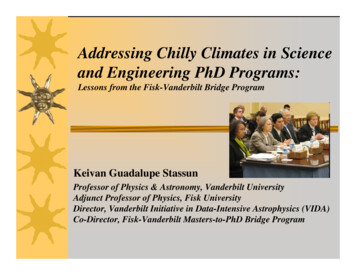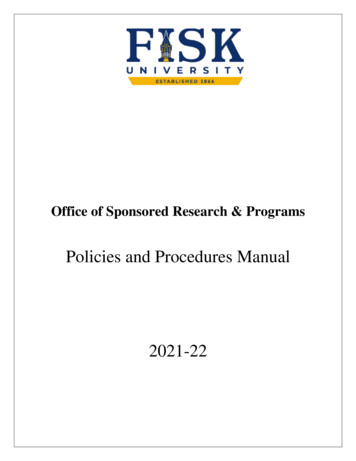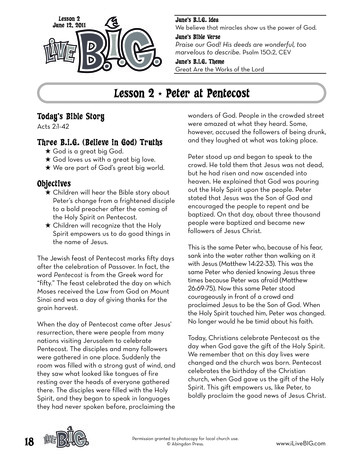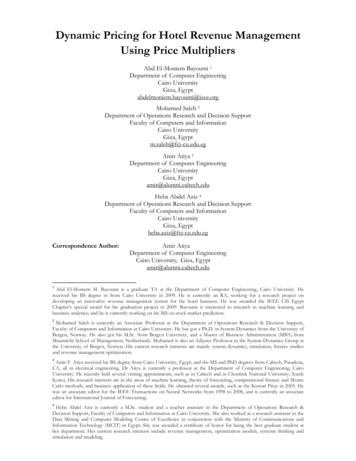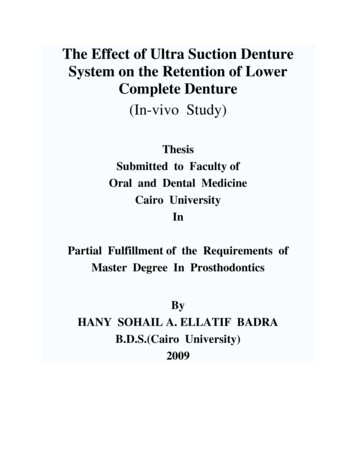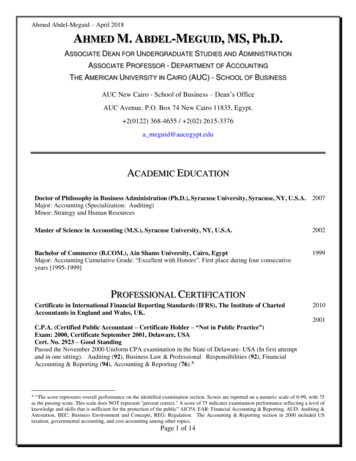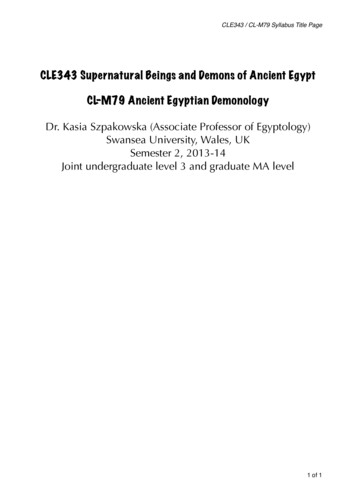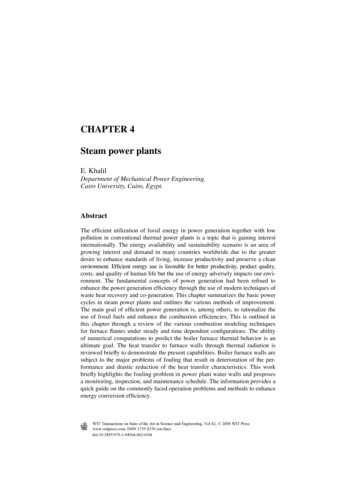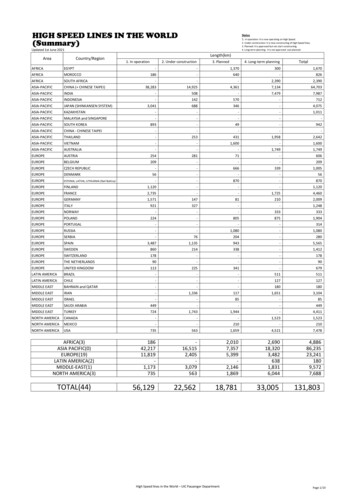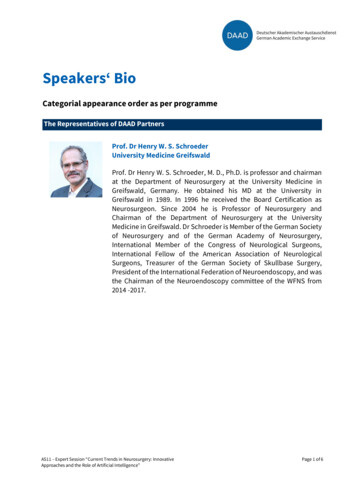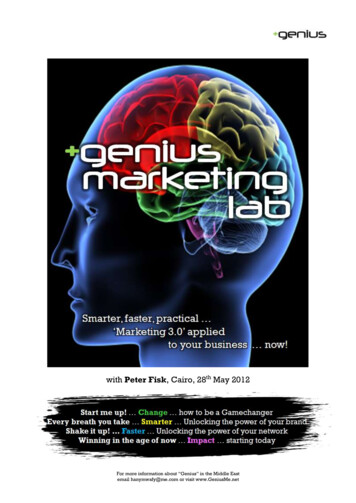
Transcription
with Peter Fisk, Cairo, 28th May 2012For more information about “Genius” in the Middle Eastemail hanymwafy@me.com or visit www.GeniusMe.net
peter fiskis a “gamechanger” making sense of incredible and relentless change,learning from a new generation of brands and business, digital and physical, large and small inspiring and enabling you to innovate and win in the exciting new world of business.He is a bestselling author and inspirational speaker, combining the most inspiring ideas andpractical action, and an in-demand advisor to business leaders around the world.Peter leads GeniusWorks, a strategic innovation business based in London and Budapest, Istanbuland Dubai, that works with senior management to “see things differently” – to develop andimplement more inspired strategies for brands, innovation and marketing. Gamechanger is astrategy accelerator for leadership teams, Innolab is a facilitated innovation process based on deepcustomer insights and creative thinking, and BrandOptima is a platform to develop better brands andbrand portfolios.His next book is The Gamechangers about the new generation of businesses - from Alibaba toZipcars, Aberchrombie to Zynga - who are transforming markets with bolder brands, smarterinnovation and clever marketing. They play by different rules, embracing the growth of emergingFor more information about “Genius” in the Middle Eastemail hanymwafy@me.com or visit www.GeniusMe.net
markets and power of digital networks, human design and social entrepreneurship, and they winwith better results.His previous books included Creative Genius brings together entrepreneurs and artists, rockstarsand rockets scientists, in "the essential guide to innovation for leaders, visionaries, and bordercrossers". Marketing Genius explores the left and right-brain approaches to competitive success(translated into 35 languages), Customer Genius describes how to build a customer-centric business,Business Genius is about inspired leadership and strategy, whilst People Planet Profit explains how togrow, and be good.Peter grew up in the remote farming community of Northumberland, in the North East of England,and after exploring the world of nuclear physics, joined British Airways at a time when it wasembarking upon becoming “the world’s favourite airline” with a cultural alignment aroundcustomers.He went on to work with many of the world’s leading companies, helping them to grow moreprofitably by becoming more customer-centric in their structure, operations and leadership. Heworks across sectors, encouraging business leaders to take a customer perspective, and learningfrom different types of experiences. His clients include American Express and Aeroflot, Coca Colaand Cooperative Bank, HSBC and Lastminute.com, Marks & Spencer and Microsoft, O2 and Orange,Philips and Red Bull, Shell and Tata Steel, Teliasonera and Turkcell, Vitra and Virgin, Visa andVodafone.He was also the transforming CEO of the Chartered Institute of Marketing, the world’s largestmarketing organisation. He led the strategic marketing consulting team of PA Consulting Group, wasMD of Brand Finance and partner of The Foundation, before founding his own business, the GeniusWorks. He was recently described by Business Strategy Review as “one of the best new businessthinkers” and is in demand around the world as an expert advisor and energising speaker.You can contact by email at peterfisk@peterfisk.comOr visit his website at www.theGeniusWorks.comOr on twitter @geniusworksFor more information about “Genius” in the Middle Eastemail hanymwafy@me.com or visit www.GeniusMe.net
The Gamechangers is the next book from Peter Fisk, about the new breed of businesses rising in achanged world, embracing ideas and networks, new markets and new business models Apple toZynga, Alibaba to Zipcars.Global markets, power shifts and emerging whitespaces. Crisis was the crying pain of a changingworld – a global revolution, a consumer revolution and a technological revolution. Markets havebeen transformed, with new rules and new opportunities.New market leaders. From Alibaba to Li & Fung, Pinterest to Spotify, a new breed of business haveseized the moments of change to transform markets, and topple the old leaders. Forget Sony thinkSamsung, instead of Nike think Li Ning The new breed of market leaders think and act differently. They fuse digital and physical, global andlocal, ideas and networks. They win by being smart, fast and connected – rather than through scaleand efficiency.For more information about “Genius” in the Middle Eastemail hanymwafy@me.com or visit www.GeniusMe.net
They embrace all the new business tools - from empathetic design to disruptive technologies, socialmedia to sustainable innovation – creatively bringing them together for more market and businessimpact.These are the building blocks for you to come a gamechanger too. Human customer-driven, human-centred emotionally-engaging businessResponsible doing better by doing good, socially and environmentallyCreative design and innovation, to think bolder and simpler, different and betterNetworked built around networks and partnerships of supply and demandSocial social media and online communities, but local and tribal tooParticipative crowdsourcing, co-creating, collaborating with customersFor more information about “Genius” in the Middle Eastemail hanymwafy@me.com or visit www.GeniusMe.net
For more information about “Genius” in the Middle Eastemail hanymwafy@me.com or visit www.GeniusMe.net
For more information about “Genius” in the Middle Eastemail hanymwafy@me.com or visit www.GeniusMe.net
For more information about “Genius” in the Middle Eastemail hanymwafy@me.com or visit www.GeniusMe.net
For more information about “Genius” in the Middle Eastemail hanymwafy@me.com or visit www.GeniusMe.net
For more information about “Genius” in the Middle Eastemail hanymwafy@me.com or visit www.GeniusMe.net
For more information about “Genius” in the Middle Eastemail hanymwafy@me.com or visit www.GeniusMe.net
For more information about “Genius” in the Middle Eastemail hanymwafy@me.com or visit www.GeniusMe.net
For more information about “Genius” in the Middle Eastemail hanymwafy@me.com or visit www.GeniusMe.net
For more information about “Genius” in the Middle Eastemail hanymwafy@me.com or visit www.GeniusMe.net
For more information about “Genius” in the Middle Eastemail hanymwafy@me.com or visit www.GeniusMe.net
For more information about “Genius” in the Middle Eastemail hanymwafy@me.com or visit www.GeniusMe.net
finding a better placePeter Fisk sees a new business world, where a new generation of brands and innovators arereshaping markets, and seizing the opportunities of change.We live in a VUCA world – volatile, uncertain, complex and ambiguous – but at the same timevibrant, unreal, crazy and astounding. Whilst change and uncertainty can lead to fear and inertia,change is also the catalyst for new opportunities and the breeding ground of innovation.Indeed your world might still feel turbulent and if not because of economic crisis, then because ofthe relentless flow of technology and expectation. Yet change offers vibrant opportunities for newbeginnings – culturally and commercially, and particularly for those with entrepreneurship in theirblood. Everything has been shaken up. Everybody has had to change their mindsets. And now is thetime to look forward not back.As Pablo Picasso once said “Times of turbulence are the most exciting times, because everythingchanges” and with change comes new ideas, and new opportunities.Every part of the world is either struggling or thriving on change – from crisis hit Athens to thebeautiful wind-farms of Mexico, debt-ridden New York to digital-manic Hyderabad. However it is thesmaller companies, the entrepreneurs who are doing best. Like any great innovator, they are seeingthings differently, and thinking different things.The reality is that most large companies are unable to see or respond to the changes. Success forthem was born in the old world, where western economies boomed, consumers were predictable,and digital was a cosmetic enhancement. They cling to the formulae which made them great, oftenoblivious to the speed and nature of change. From Coke to Levi’s, Microsoft to GE, the old heroesare slow to rethink.For more information about “Genius” in the Middle Eastemail hanymwafy@me.com or visit www.GeniusMe.net
Air Asia “resolving the paradox” of being able to offer low cost and premium serviceNewness occurs in the margins, not the mainstreams with the niches, the upstarts, and survivors.The best ideas are often born out of adversity in developing markets - the trends for frugalinnovation, discount shopping, and social marketing. Solutions often emerge through fusions ofexisting concepts, and particularly physical and digital.The new investment capitalists now cluster in Schenzen, the best web designers are in Mumbai, thecreative fashion houses are in Beunes Aires, green technologies are strongest in Shanghai. Digitalbrands become physical, physical add digital. Mobile networks embrace banking and shopping.Economic and social change are the catalysts to think differently, whilst digital and green tech arethe means to innovate and grow. Air Asia’s virtual business model enables it to be the world’s fastest growing and one of themost profitable airline, a fusion of luxury and low cost. The Virgin-backed outsourced-modelis a great example of focussed growth. Current TV’s user-generated content, and schedule voting, delivers one of the mostengaging and profitable media channels. Al Gore and his team have created a social mediabusiness model that is more authentic and successful. Tata Nano appeals to a billion Indians with a 2000 price point that could never have beenachieved through incremental thinking. When Ratan Tata dreamed of a step-change, hisengineers had to work “future back” to achieve it. Christian Audigier achieved high speed fashion leadership with brands like Ed Hardythrough network-based licensing deals. No longer is making and distribution the heart ofbusiness. Ideas, design and partnerships are key. Zynga, the parent of huge viral games such as Farmville, are dedicated innovations formobile platforms, and lives. Facebook did not become sticky because of its networking, butbecause it’s fun and addictive content.For more information about “Genius” in the Middle Eastemail hanymwafy@me.com or visit www.GeniusMe.net
Better Place is ready to dominate the electric car market, more than any car brand, with itsglobal network of charging points. As Shai Agassi boldly shows, the future is about networksthat reshape industries and markets. Virgin Galactic seeks to innovate inter-continental travel, more than being a rich person’salternative to Disneyland. With zero-emissions, Branson and team can take you to space, buthave a more practical goal in mind too.A new generation of market leaders is emerging in front of our eyes. Not yet the largest brands interms of share or scale, but many already profitable, and positioning themselves for a differentworld, as reflected in their market valuations.Zynga’s Farmville has attracted 200 million monthly users, creating 20bn in 4 yearsSo what is stopping us from exploiting these new worlds?Why focus on your existing market, with concerns of more turbulence, uncertainty and zero growth,whilst other markets like Brazil and India, Mexico and Turkey are back up into double digit growth?Why tinker with your website and home delivery, when other companies are transforming theirwhole business models and customer experiences?The real problem is mindset, not process. And in particular, leadership mindset.We still think that we are great - that “home” markets come first, and global markets come second,that doing what we do better, is better than change, looking west not east, believing in being big notsmall, driven by today not tomorrow.Who can change this? You! Not the crest-fallen politicians, the devalued economists, or even theincreasingly-uncomfortable big company leaders. You, with an open-minded, outside-in perspective making sense of new landscapes, building a vision that inspires others, being bold in creatingnew ideas, and making them happen.As Ghandi said, don’t wait for others, “be the change”.Innovation not incrementalism, it’s time to think biggerFor more information about “Genius” in the Middle Eastemail hanymwafy@me.com or visit www.GeniusMe.net
We become programmed into watching competitors more than consumers. And we fear doinganything, that somebody else hasn’t done before. We build brands and value propositions on beingslightly different from others, rather than doing something in a better or more relevant way forconsumers. We justify business cases based on competitor base cases, and how we can surely dobetter.Innovation, as people like Leonardo da Vinci showed us, is much more than this. It is about newness,either in terms of invention or application, and in our world, ensuring that it can create a step changein value to consumers, as well as the bottom line. This requires “bigger thinking”.We live in an ideas economy. We need to be the ideas agents – searching for them, shaping them,and applying them - looking beyond the current competitive set, learning from what works inadjacent categories and other geographies, teasing out insights about emerging consumer needsrather than those conditioned by current usage. These are the starting points to innovation.But beware new product development. This is slow, costly and largely incremental. Research showsthat most innovation is still focused on the hard stuff. Despite our calls for customer-centricity, itusually results in a new product. Innovation applied to other areas, particularly applying the digitalbenefits of networks and interactivity, can have far more impact at a fraction of the cost. The topareas for ROI on innovation are Rethinking brands – rethink the ambition of your brand – how can it make life better, howcan it engage people - through sharing a richer, more relevant purpose. Brands are aboutconsumer dreams not the products you sell. Market strategies – the world is your oyster, your challenge is to focus on the bestopportunities for you – sectors and categories, geographies and segments – think about thisbefore you even contemplate your market ”ing” strategy. Business model innovation – redesigning your revenue streams, costs and capabilities, andtransaction models - like Amazon and Google did, and now Threadless to Zipcars and therebycreating the most engaging clothing and revolutionising car hire. Customer experience – innovative channels, service and retail theatre, learning from Dell toPret, or more recently Aberchrombie to Zappos, recognising that buying is more emotionalthan a click. And then enabling people to do more with what they buy. Supply networks – more virtual supply networks, fast and responsive, sharing costs andrisks, collaborating with new brand partners, enabled by the likes of Alibaba which is theeBay of suppliers, and Li & Fung now responsible for 40% of the world’s clothing. Fast and frugal – ultimately, it’s about action – doing the right thing, doing it faster, and oftendoing it cheaper. That doesn’t mean slash your budgets, but think smarter and differentlyabout how to do it just like every one of today’s new market leaders.Digital technologies are at the heart of these innovations, but not simply as a physical extension orvirtual pure play – instead it’s about a fundamental integration of how businesses work. And thatstarts with an inspiring purpose – how do we make life better for people, in some way – and thencascades through to value propositions and experiences, to products and services, operationalstructures and partnerships, and the bottom line.For more information about “Genius” in the Middle Eastemail hanymwafy@me.com or visit www.GeniusMe.net
Alibaba, Amazon, Zipcars, Zynga these are true hybrid business (physical but digital, digital butphysical), driving business innovation (innovative products, services, business models, experiences,channels, sales, pricing, communication, and much more) and driven by the vision, insight anddetermination of their people.Of course many business innovators, from Jeff Bezos to Meg Whitman, Shay Agassi to Ratan Tata,have succeeded with a marketing mindset, it requires marketers to fill the role, particularly inorganisations led by people with financial or operational backgrounds.Love or hate ROI, innovation is the engine of value creationBrands, marketing and innovation are at the heart of business – from purpose to performance – andthere is no getting away from the fantastic richness of data analysis which we have available to us.Yet, due to lack of capability or confidence, or maybe even laziness, we see data as the adversary orcreativity, rather than a supporter. We need both, and we need to learn to use them together.Market analytics, building an in-depth understanding of market dynamics – from segment profilingto value drivers analysis, price elasticity to scenario modelling – enables us to focus our creativitywhere it can have most impact, both in terms of marketspaces and marketing actions. Focusedcreativity - understanding the real problem to solve, the best opportunity to seize – is likely to havefar more success, than random intuition filtered by prejudice and convention.Therefore data is essential at the start of the innovation process, but also at the end.Being able to stand before investors or business leaders, and explain how a fantastic new innovationproject will deliver 460m of economic value to the business is unbelievably powerful. Particularlywhen you can talk with logic and confidence about how it will be delivered. Combining consumerresearch, creative ideas and financial analysis becomes the real alchemy of a great marketingleader.Investment analysts spend their careers trying to project the future profits of business, and CEOs andFDs understandably become preoccupied with this too. Therefore, if you can make your case interms of five-year value impact, including revenues and costs, investments and risks, it is a farstronger conversation than trying to estimate revenues next year, or worse still, being seen as arisky cost.Of course “value creation” can be misunderstood as shareholder greed, the bloated bonuses ofbankers and narrow-minded hedge funds that destroy organisations. Yet smarter investorsrecognise that the best ideas, the best organisations, are worth investing in for the long-term. Theydon’t seek a quick buck, they don’t want to just pocket the profits and live for today. They see, likeBetter Place, that real value is created over time, and that finding a way to create a better world socially and environmentally – is all part of creating a richer, more sustainable cycle of wealth.Business needs bigger thinking, new ideas and fresh inspiration, to move forwards.Everyone understands that real creativity and disciplined innovation are the lifeblood oforganisations today. Therefore with focus and confidence, every organisation needs new “ideaagents” – visionaries, catalysts, disruptors and facilitors – driving their businesses in in the rightdirections, shaping the world around them in a better way, reengaging people with hope andinspiration, seizing the opportunities of a VUCA world. Peter Fisk 2012For more information about “Genius” in the Middle Eastemail hanymwafy@me.com or visit www.GeniusMe.net
hello, I am your customerExtracts from the bestselling book “Customer Genius: How to become a customer-drivenbusiness” by Peter Fisk including case studies of Umpqua Bank, Net a Porter and Li and Fung.Hello!I am your customer Yes, a real person, a human being.I have my needs and wants, to get through the day, and to achieve what I must.But I also have my hopes, dreams and ambitions.For too long you have treated me as a name or number.You group me into what you call a segment, or sometimes just a mass market.But I’m not prepared to tolerate that anymore.I am me. Don’t treat me like somebody else.Sometimes I might be very similar to others,but I can also be very different and discerning.For more information about “Genius” in the Middle Eastemail hanymwafy@me.com or visit www.GeniusMe.net
In the old world, I realise I didn’t have much choice.I needed you more than your needed me.But things have changed.Now I have the power. Now I’m in control.You need me, more than I need you.It’s time you started doing business on my terms.In fact, why are you actually in business?Just to make as much money as you can, from whatever you can?Or to make a difference, to make my life better?I don’t mind if you make money.If you can do something more for me, I want you to succeed too.Why don’t you learn a bit more about me? Come and listen to what I really want.In fact, I’d love to tell you what I’m really trying to achieve.Not just whether or not I want your latest gadget, gizmo or gumption.Why don’t we get together and find a way to really solve my problem?I’d even be happy to pay more if you can really help me find the right solution.And what about that brand of yours?Your name, your logo, and all those pretentious advertising slogans?They’re all about you, and how great you are.Actually, Im more interested in me, and what you can do for me.Start thinking about my world.Don’t sell me travel tickets, help me explore the world.Don’t sell me running shoes, help me to run a personal best.Don’t sell me potted plants, help me to create a magical garden.Stop bombarding me with your smug (but highly creative, you tell me) campaigns.For more information about “Genius” in the Middle Eastemail hanymwafy@me.com or visit www.GeniusMe.net
Telling me what you want to sell, when and how you want to tell me.I’m not here just to prop up your sales targets.I have got a life you know. I will buy things, but in my own time, on my terms.Worst of all are all those unsolicited mail shots and phone calls.They interrupt me and frustrate me. And eventually make me hate you.When I do want something, I expect it to be easy.Come to me, to places convenient for me.Rather than making me go to places convenient for you.I expect what I’ve seen online to be in your stores, or to be available by phone.And to be able to take it back to any of your places, if I don’t like it.And when I do decide to buy something from you, please don’t call me Sir orMadam.I’m not a knight of the realm, I’m a real person, remember.Don’t just follow a process or a script. Try and learn something about me.And whilst we’re on the subject of stereotypes, please don’t say goodbyeWith one of those fake smiles and “have a nice days”If I can get any book or music delivered to my door in 24 hoursThen I expect a new car, a new washing machine, and new home to be just as quick.And if you treat me with you the best service when I’m a big cheese at workThen I don’t expect to come back later and be treated like trash as an individual.Treat me as a human being. And be a human being too.I know you get rewarded for satisfying me. But frankly I expect much more than that.I demand 100% satisfaction, and 100% of that so-called delight too.Every time I talk to your people. Every time I experience anything to do with you.It should be right, it should be excellent, it should be perfect.However I don’t want the same every time. Life’s too short and a bit boring.For more information about “Genius” in the Middle Eastemail hanymwafy@me.com or visit www.GeniusMe.net
To be honest, I’d sometimes like you to surprise me!Which brings me to something I know you care about a lot.Loyalty. Whether I really want to come back again. And do. And buy more. And tellothers.So you give me a plastic card. With something like a 1% discount.Hmmm. To be honest I think loyalty is something that has to work both ways.If you trust me, care for and do more for me. I might just do likewise.But a relationship is perhaps asking too much of me.Do I really want a relationship with a big anonymous company? I think not.I know you invested millions in those customer relationship management systems.But all I get is yet more pieces of direct mail. About what and when you want.I’d much prefer to get to know other people who share my passions.For travelling. Or running. Or gardening. Real people like me.The best thing you could do is help me build relationships with other people likeme.Help me to share my ideas and interests, and to do what I love most.I’m then happy to buy your products. And delighted to be part of your community.And you might even find the things I say and share, are valuable to you too.Surely measuring how strongly I feel about you, and intend to do more with youAre much better, forward-looking indicators of your success, than your financialhistory.And one final thing about people – the real people, the human beings who work foryou.What makes them tick? Want to do more? To even surprise me?Because I bet they care a lot more about me and what I’m trying to achieve too.Than just selling another product to an anonymous segment.When you think about it. I know you’re a real person just like meBut when you go to work you put your blinkers on.For more information about “Genius” in the Middle Eastemail hanymwafy@me.com or visit www.GeniusMe.net
You restrict yourself to some artificially defined sector.Whilst I see a bigger, more exciting, more connected world.You become a slave to short-term, transactional thinking.Whilst I think without limits.You follow conventions and prejudices of your own making.Whilst for me, everything is possible.It’s simple really. You’ve just got to see my world.Do business from the outside in. Not the inside out.Real people together. With so much more opportunity.Together we can do extraordinary things.Becoming a customer centric businessWhether it’s the way you define your business, the style in which you serve your customers, orwhere you look for new ideas and inspiration, the chances are that you are still on the inside lookingout, rather than the outside looking in.We are all human – we all have dreams and aspirations. Yet when we go to work, we put our blinkerson – we restrict our thinking to our defined sectors and functional roles, we limit our ambitions to thescope of our responsibilities and rewards. We stop being real people.We commend ourselves to be customer focused, or even customer centred. We seek to delivergreat service, or rather service experiences. And we hope to gain the loyalty of customers, bypersuading them to have relationships with us. The problem is, we do all of this from the inside out.Our starting point is still, invariably, our business - our brands, products, and targets. We do it onour terms. This doesn’t work anymore.Customers now have the awareness, knowledge and power to demand better. Their trust is low andloyalty rare. They are more different and discerning, and their expectations are incredibly high. Ifthey can buy any item from Amazon, and receive it in 24 hours, then they expect that as a minimumservice level from you. They also want more – to be enabled, energised, and even surprised.Doing business from the “outside in” means doing it why, when, where and how customers want.Similarly, we grow complacent with the same old benchmarks – the familiar case studies, theinnovations that become the conventions, the same old stories of “legendary” service. SouthwestAirlines, and even Innocent Drinks, were great mould breakers, but the world keeps moving on.Seeing things from the outside in is also about learning from other markets, learning from companieswith similar challenges in completely different sectors. As I travel around the world – speaking toFor more information about “Genius” in the Middle Eastemail hanymwafy@me.com or visit www.GeniusMe.net
and advising companies large and small - I meet the most amazing people, and learn about trulyinspiring brands, with ideas that really make you think.In recent months I have been inspired by the Latvian heritage of Stenders Soap Factory, the digitalentrepreneurs of Estonia, the funky Serbian water of Voda Voda, the designer Turkish bathrooms ofVitra, the ultimate luxury of Banyan Tree, Natura and the beauty secrets of Brazilian girls, Celpay’smobile payment systems in Africa, and the fusion designs of China’s first luxury brand, ShanghaiTang.Here are three examples of extraordinary service, delivered in truly innovative ways: Oregon’sUmpqua Bank, the funky and fast-growing financial services business that rejects conventions, Net aPorter showing how to apply similar attitudes in the online world, whilst China’s Li & Fung is doinglikewise as a B2B business.Case Study 1: Umpqua Bank. How Gap and Starbucks inspired “the world’s greatest bank” and acustomer experience that is the envy of America.The River Umpqua weaves a lazy path through the green and golden forests, deep and ruggedcanyons of Oregon State.This is the land of lumberjacks, and in 1953 the South Umpqua State Bank was founded to serve thepeople of Canyonville, population 900. It was a small, traditional bank, loved by locals and proud ofits reputation for great service. It was also very conservative, and only started to grow by acquiringone or two other small local banks.In 40 years it grew to six branches, with a market cap of 18 million. However with the loggingbusiness starting to decline, the bank looked to be heading in a similar direction. Most peoplethought it would be swallowed up by a national giant, but the Board were determined to maintaintheir independence. When the long-time president decided to retire, they thought about promotingfrom within, but something in their pioneering blood told them to look wider.They took a big risk, hiring someone who was anyt
Marketing Genius explores the left and right-brain approaches to competitive success (translated into 35 languages), Customer Genius describes how to build a customer-centric business, Business Genius is about inspired leadership and strategy, whilst People Planet Profit explains how to grow, and be good.

